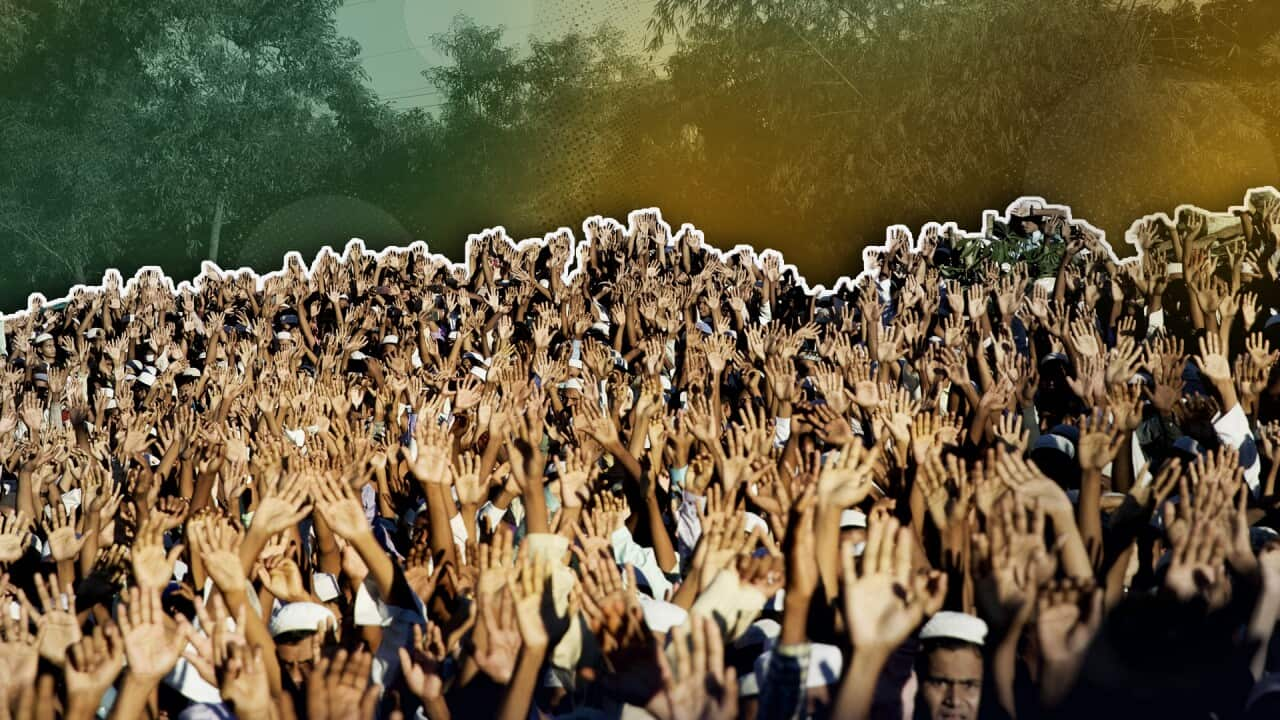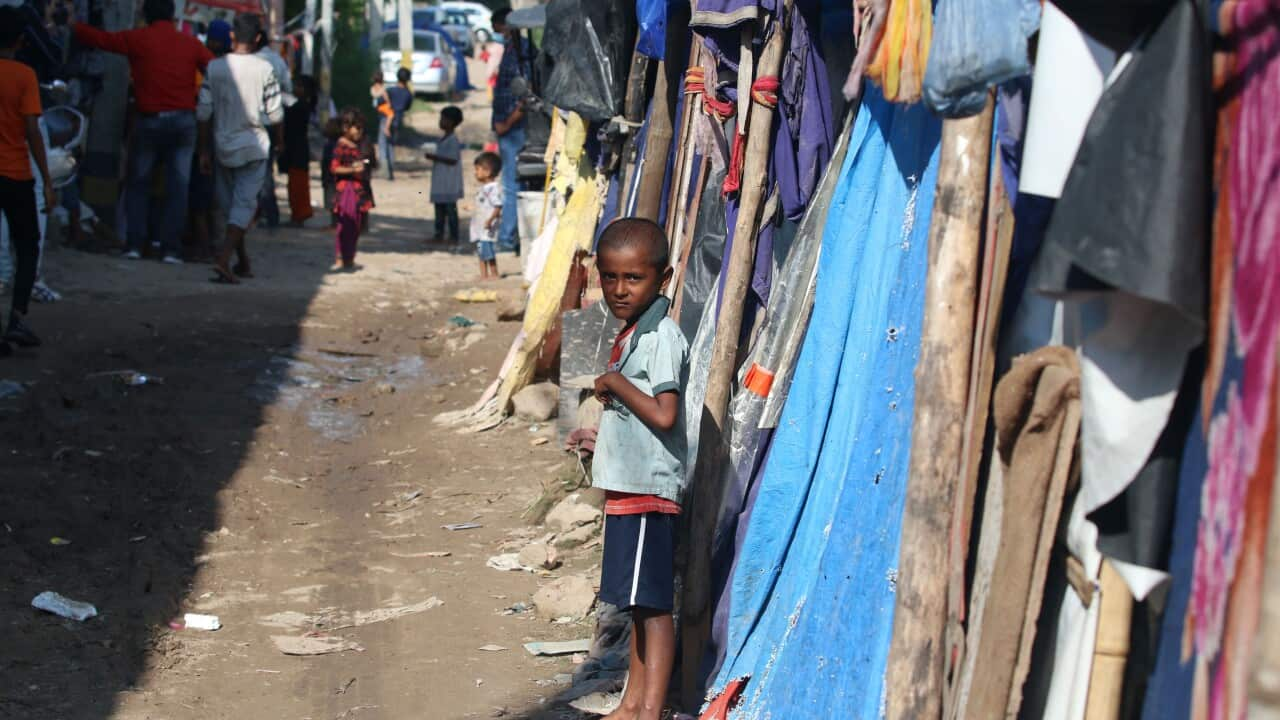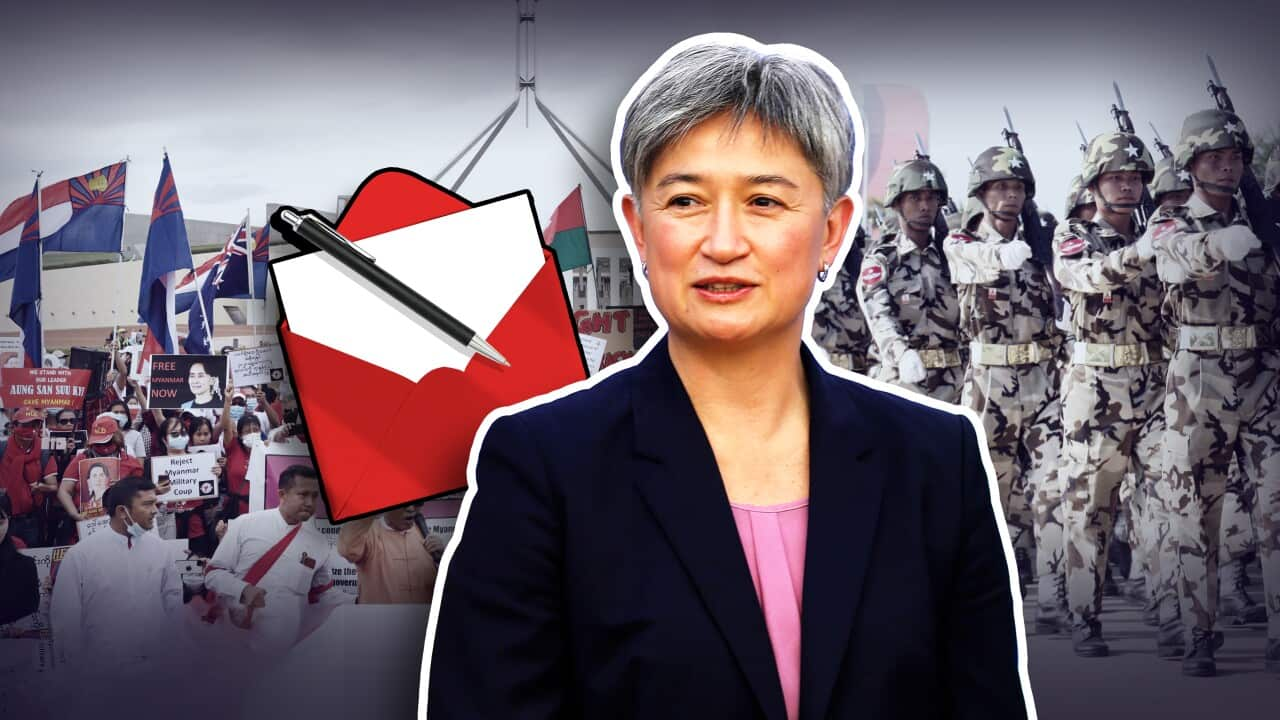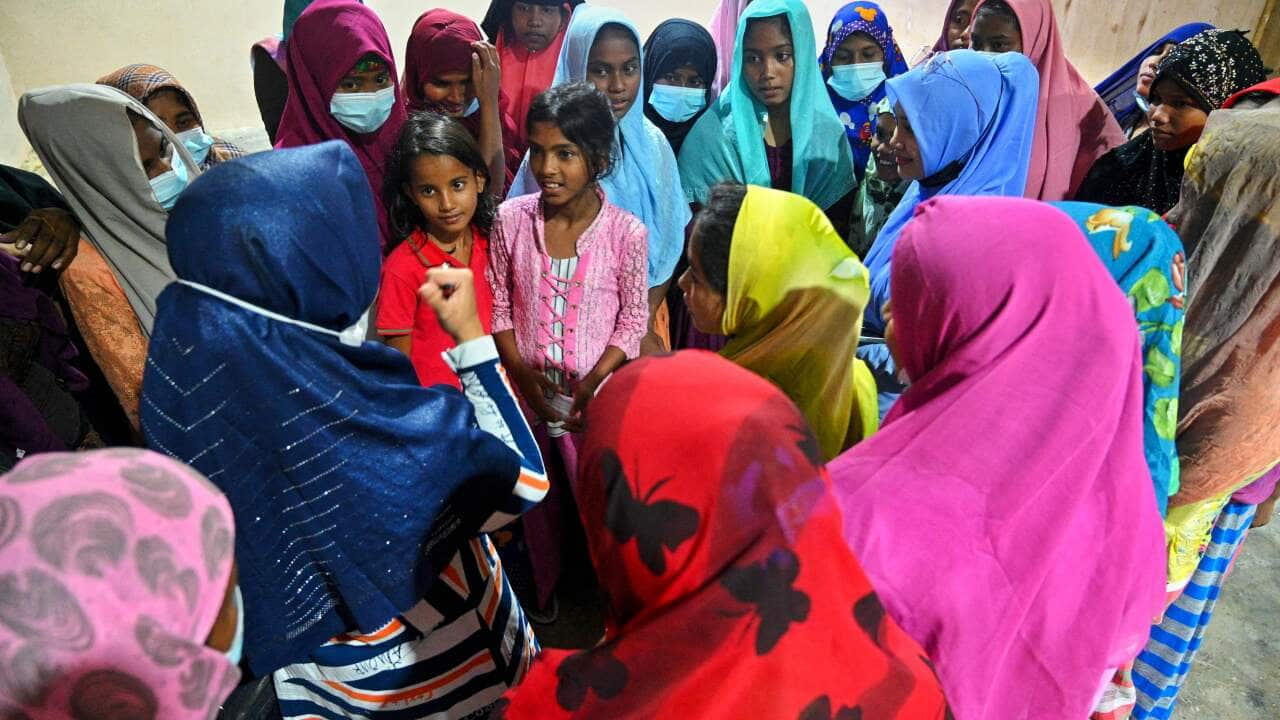

9 min read
This article is more than 2 years old
The world's biggest refugee camp is at breaking point. What is Australia doing to help?
Five years since hundreds of thousands of Rohingya Muslims fled Myanmar for neighbouring Bangladesh amid a deadly military crackdown, there are calls for Australia to increase its support for those caught in what's been described as a “forgotten crisis”.
Published 25 August 2022 6:04am
Updated 25 August 2022 6:09am
By Abbie O'Brien
Source: SBS News
Image: Mourners at the funeral of Rohingya leader Mohibullah in Cox's Bazar, 2021. (Getty, SBS / Mushfiqul Alam/NurPhoto)
His life is seemingly an endless cycle of suffering, but Nural Amin's faith remains strong. In a makeshift prayer room at the back of a home in Sydney, he, along with other members of the Rohingya community, observe Islam's sunset prayers.
Mr Amin spent the first 15 years of his life confined within the razor wire fences of what is now the world's largest refugee camp by population size, in Cox's Bazar, Bangladesh.
He was just a baby when his family fled persecution in Myanmar and the camp - or series of camps - is now home to around a million people.
“It was very difficult,” Mr Amin says. “There is no opportunity to study, no jobs, there is not any medication, not enough food - it is not a life.”

Nural Amin fled the refugee camp in Bangladesh and now lives in Sydney. Source: SBS News
But his family and friends are still languishing in Cox’s Bazar along with a whole new Rohingya generation.

Source: SBS News
“The first displacement of the Rohingya was over 40 years ago, so we’re talking about four generations that have experienced violence and have had to flee and find security elsewhere,” he says.
Before 2017, the camps in Cox’s Bazar were home to around 34,000 refugees, but in August that year, the Myanmar military unleashed a deadly crackdown on the Rohingya. Almost 7,000 people, including children, were killed in the month after the violence erupted, according to MSF.

Source: SBS News
Five years on, the makeshift settlements (the UN says there are 34 camps) are now home to about a million people, squeezed into an area of just 26 square kilometres. UNHCR data from the end of July put the total number of Rohingya people there at 936,000.
“We have the pressure building and building on this population, you know where they can go? What can they do? Who is going to change this situation?,” Mr McPhun says.
“We are in the middle of a political stalemate to find any solutions, and as the situation goes on the population gets more and more desperate and at a certain point it's going to fall apart. This system of containment is going to collapse.”

Makeshift dwellings at one of the Cox's Bazar camps. Credit: SOPA Images/LightRocket via Getty Images
“As you can imagine, [the people] are despondent, they are in despair about what is going to happen to them, what will happen to their children. They have no mobility, no freedom of movement, they’re literally contained in this state of suspension, waiting for change.
“There are huge rates of depression among our patients that visit us for mental health consultations.”
Growing risk of human trafficking
Trafficking of Rohingya people in Southeast Asia has long been an issue, but Mr McPhun says as desperation grows, so too does the risk of exploitation.
In 2015, Paween Pongsirin led Thailand's response to human trafficking and exploitation of the community. He's now living in exile in Australia after his investigation implicated senior figures in the Thai police and military. He’s witnessed the horrors of trafficking and believes the networks he was once tasked with uncovering are still operating.
“The Rohingya were kept in camps, they were beaten up, tortured, and the women raped. For those who tried to escape, they would be captured and killed and the body would be buried in a mass grave. I once uncovered 36 bodies in a mass grave,” he says.
“It's really hard for this network to stop [because] they cannot arrest anyone from the military.”

Paween Pongsirin led Thailand's response to human trafficking and exploitation of Rohingya. Source: SBS News
Mr Rauf, who fled Myanmar in the 1980s, set up the Arakan Rohingya Development Association in 2017. The organisation functions both as a support service for new arrivals and a means of raising awareness of the plight of the Rohingya.
He says many in the community have relatives inside the camps, himself included.
“Here in Australia, our people are also suffering … they have been separated from their family for many years.
“I hope the Australian government, the Australian community do not forget us.”

Mohammad Rauf of the Arakan Rohingya Development Association. Source: SBS News
“[They can work in] farmland, agriculture industries…our people can help.”
In a statement, a spokesperson for the Department of Home Affairs said it "is committed to generous and flexible Humanitarian and Settlement Programs that meets Australia’s international protection obligations,” adding that since 2009, “more than 470 visas have been granted under the Humanitarian Program to people identifying as Rohingya”.
But the United Nations says Australia should "contribute more."
I hope the Australian government, the Australian community do not forget us.Mohammed Rauf
“Australia has a responsibility to share equitably that burden,” said Gillian Triggs, the Assistant High Commissioner for Protection at the UN Refugee agency UNHCR.
Ms Triggs is the former Australian Human Rights Commissioner. She also wants to see the federal government increase its financial assistance to the camps, which she says are “desperately underfunded.”

Prayers ahead of a Rohingya community meeting in Sydney. Source: SBS News
Repatriation efforts have stalled in recent years, largely because of the 2021 coup, which saw the military seize full control of Myanmar. In January, the Bangladesh government and the Myanmar military junta resumed talks on repatriating Rohingya refugees.
Two previous attempts to encourage Rohingya people to return to Myanmar had failed, with refugees unable to be convinced it would be safe to go back.
This month, the UN High Commissioner for Human Rights, Michelle Bachelet, went to Cox's Bazar as part of a visit to Bangladesh. On 17 August she said she had heard from Rohingya refugees a "resounding hope they will be able to return to their villages and homes in Myanmar – but only when the conditions are right".
"Unfortunately the current situation across the border means that the conditions are not right for returns, " Ms Bachelet said.
Ms Triggs agrees: “The tragedy for these people is that they desperately want to return home to Myanmar but they cannot in these current conditions”.
She is calling on Australia to reopen diplomatic channels with Myanmar.
“To try to persuade Myanmar to address some of the root causes, in particular, the denial of access to national citizenship, to identity documents. And ensure they can return safely and securely, that they are able to return to schools, have access to healthcare, and of course, access to livelihoods.”
A spokesperson for the Department of Home Affairs said: “the UNHCR and the international community continue to work on creating conditions for a safe return of Rohingya people to Myanmar. Australia’s response continues to focus on humanitarian aid to Bangladesh and Myanmar”.
In 2019, then Foreign Minister Marise Payne toured the Cox's Bazar camps. Following she announced an extra $10 million in emergency assistance from the Australian government. The funding was in addition to the $260 million it had provided for the humanitarian response for Rohingya refugees and host communities in Bangladesh since 2017.

Children account for 52 per cent of people in the Cox's Bazar camps. Source: SBS News / UNHCR
"Australia is appalled by the execution of four pro-democracy activists in Myanmar and strongly condemns the actions of the Myanmar military regime," she said.
"Australia is clear and consistent in our support of human rights around the world."
A Department of Foreign Affairs and Trade spokesperson told SBS News the government "continues to advocate internationally on the critical importance of working towards a durable solution to the displacement of Rohingya in Myanmar and Bangladesh".
"Australia urges the Myanmar military to exercise restraint, refrain from further violence, and engage in constructive dialogue."

Support facilities in the Cox's Bazar camps are stretched. Source: SBS News
Mr Rauf believes repatriation must remain the focus of international efforts, saying the world cannot standby as yet another Rohingya generation languishes inside camps.
“Everyone should have the right to go back to their land, their home, they should get back their property. They can't get back their parents and loved ones that they have lost, but they should get their rights.”
Would you like to share your story with SBS News? Email [email protected]
Share




